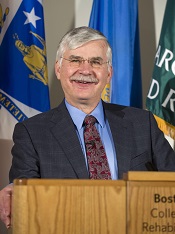 ACRM is pleased to honor Alan Jette, PT, PhD, MPH with the 2016 John Stanley Coulter Award for his significant contributions to the field of rehabilitation. Dr. Jette is professor of health law, policy and management at the Boston University School of Public Health, professor of rehabilitation sciences at the MGH Institute of Health Professions and serves as editor-in-chief of Physical Therapy.
ACRM is pleased to honor Alan Jette, PT, PhD, MPH with the 2016 John Stanley Coulter Award for his significant contributions to the field of rehabilitation. Dr. Jette is professor of health law, policy and management at the Boston University School of Public Health, professor of rehabilitation sciences at the MGH Institute of Health Professions and serves as editor-in-chief of Physical Therapy.
Dr. Jette’s research interests include late-life exercise, evaluation of rehabilitation treatment outcomes, and the measurement, epidemiology, and prevention of disability. He is an international expert in the development of contemporary outcome measurement instruments to evaluate health care quality and outcomes and has published over 240 peer reviewed articles on these topics.
From 1996-2004 he served as dean of Boston University’s Sargent College of Health & Rehabilitation Sciences. He chaired the Institute of Medicine’s 2007 study, The Future of Disability in America. From 2010-2011, he served on the NIH Blue Ribbon Panel that evaluated NIH research in rehabilitation. From 2011-2014, he co-chaired the IOM Forum on Aging, Disability, and Independence and was elected as a member of the IOM in 2013.
John Stanley Coulter Award Lecture
Dr. Jette will present the prestigious John Stanley Coulter Award Lecture during the 2016 ACRM Annual Conference in Chicago on “Moving from Dissemination to Implementation.”
While evidence-based practice is firmly entrenched in rehabilitation, how to translate evidence into clinical practice is unsettled. While major gaps in scientific knowledge exist, an enormous amount of scientific knowledge remains unused in practice. The transfer of evidence into patient care is unpredictable, highly variable, and needs to be accelerated.
Dr. Jette will discuss strategies for moving rehabilitation from innovation dissemination to actual implementation and will review several considerations guiding the choice of implementation strategy.
“If we are serious about speeding up the rate of adoption of evidence-based practices in rehabilitation,” he said, “We need to direct resources to designing and applying active implementation strategies to consistently deliver what is known to work into practice.”










